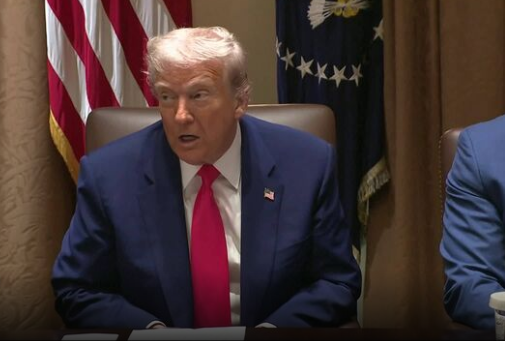After the White House clarified that the US tariffs on China would not rise to 145%, US President Donald Trump said that his tariffs might cause “transition problems”, but he was confident in his plan.
Trump said at a cabinet meeting on Thursday: “There will be costs and some problems during the transition period, but ultimately it will be a wonderful thing. Our current situation is very good.”
The United States imposed high tariffs on the world’s second-largest economy, triggering a tit-for-tat trade war that has unsettled global financial markets.
Trump will impose a 125% tariff on China, aiming to offset the US trade deficit with China and punish Beijing for its retaliatory import taxes on the US. The White House disclosed this figure in a memo on Thursday. Earlier this year, the US had already imposed a 20% tariff on China for its role in fentanyl smuggling.

Other Chinese imports, such as materials used in solar panels, have already been subject to import duties.
After experiencing the biggest buying spree in years, the stock market fell on Thursday. The S&P 500 index dropped by more than 6% before trimming its losses as investors’ concerns over the intensifying trade war gradually subsided.
Trump pointed out that the stock market’s rise on Wednesday came after he announced a 90-day suspension of tariffs on dozens of trading partners. He said, “Yesterday was an important day for us.” Later, he told reporters that he had not yet seen Thursday’s market data.
Finance Minister Scott Bessent pointed to lower oil prices, a successful bond sale and better-than-expected inflation data, but played down the significance of Thursday’s sell-off.
“Look, the ratio of two stocks rising and one falling is not bad,” said Besant, adding that he “didn’t see anything abnormal today.”
Trump told reporters that he believed the first batch of agreements were “very close to being reached” and expressed optimism that China would eventually participate in the negotiations. He also said he was willing to take “flexible” measures in terms of enterprises or countries being exempt from the tariff system, including the 10% tariff floor he set for all trading partners.
Trump said, “We have huge trade deficits with some countries, or they have huge surpluses with us, while others don’t. So it depends on the situation.”
Despite this, Trump continued to stress that if a satisfactory agreement is not reached within the next three months, he will reimpose high “reciprocal” tariffs and said he will seek to remove non-tariff barriers, even for those countries that have a trade surplus.
Besenst said that apart from Trump himself, the Treasury Department, the Commerce Department and the US Trade Representative will also participate in the discussion.
Besant told the president, “We are formulating a process,” and then added, “We will reach a very definite conclusion on the tariff issue within the next 90 days.”
Commerce Secretary Howard Lutnick said that the conditions proposed by various countries “would never have been accepted if it weren’t for the measures taken by the president.”
Gold prices rose to a record high above $3,200 an ounce as concerns over the impact of tariffs on the global economy prompted investors to turn to safe-haven assets.
Gold prices rose by as much as 1.4% in early Asian trading on Friday, closing at $3,219.48, surpassing the record high set on Thursday when they closed up more than 3% for the second consecutive day.
Liu Yuxuan, a precious metals researcher at Guotai Junan Futures Co., Ltd. in Shanghai, said, “Gold is currently the best investment option in the market.” She added, “Unprecedented trade tensions have deepened people’s distrust of the US dollar, thereby intensifying the demand for other safe assets.”